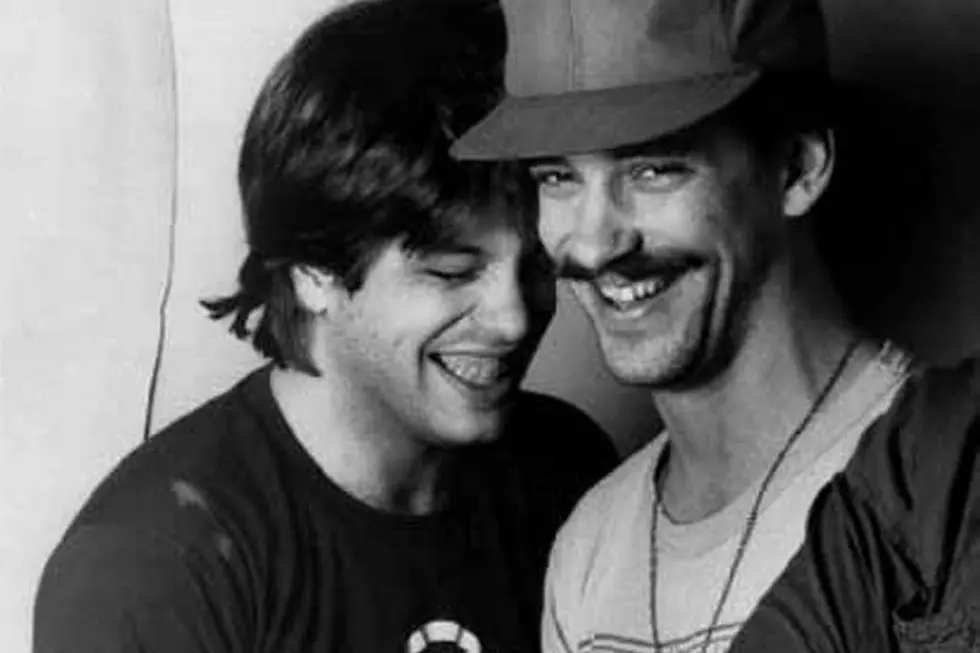
Husker Du’s Grant Hart Dead at 56
Grant Hart, one-third of the legendary and highly influential ‘80s punk trio Husker Du, has died at the age of 56.
The sad news has been confirmed via Facebook by his Husker Du bandmate Bob Mould. The Star Tribune reports that Hart had been diagnosed with terminal liver cancer a few months ago, and also suffered from hepatitis C.
Although there had been no official news of Hart being sick prior to his death, speculation about his health swirled after a surprise tribute concert on July 2 at the Hook & Ladder in Minneapolis that included Soul Asylum’s Dave Pirner, Husker Du bassist Greg Norton and other members of the Twin Cities music scene. The evening was quickly organized by Lori Barbero of Babes in Toyland and it was described by both the Current and the Star Tribune as being very emotional. Combined with pictures of a frail-looking Hart, fans who read between the lines could conclude that Hart was ill.
Born in St. Paul on March 18, 1961, Hart learned to play drums as a teenager. He and Norton were working at record stores in St. Paul. As recounted in Michael Azerrad’s Our Band Could Be Your Life, Hart, Norton and keyboardist Charlie Pine were hanging out a bar called Rob’s Randolph Inn when Pine mentioned to the manager that he had a band called Buddy and the Returnables. He booked them on the spot, but there was one issue: Pine didn’t really have a band. So the three of them formed and Hart recommended a guitarist and student at nearby Macalester College he knew who often came into his store, Bob Mould.
The quartet quickly threw together a night’s worth of covers, and during those rehearsals, decided to change their name to Husker Du. However, Mould, Hart and Norton soon realized that Pine wasn’t a good fit and began practicing and writing without him. At their second gig, at Macalaster’s annual Spring Fest, they began playing the original songs, with Pine trying to follow along. A friend of Hart’s, Steve “Balls” Mikutowski, pulled the plug on Pine’s organ and gave him a thumbs-down, then gave the other three a thumbs-up, summarily firing him.
Over the next year, Husker Du quickly became known around the Twin Cities for playing louder and faster than anybody else on the scene. It was reflected in the title of their 1982 debut, a concert recording called Land Speed Record. After Everything Falls Apart and an EP, Metal Circus, they signed with SST, the label owned by Greg Ginn of Black Flag. Although they were lumped in with the nascent hardcore scene, the sturdier melodies and technical abilities of the musicians made them stand out from the pack.
Their next few records, Zen Arcade, New Day Rising and Flip Your Wig — four albums worth of material released within 15 months from 1984-85 — saw tremendous growth and a sharpening of their focus, and Warner Bros. came calling, with Candy Apple Grey arriving in 1986. However, conflicts between Mould and Hart pulled the band apart. The suicide of manager David Savoy in 1987 as they prepared to tour behind Warehouse: Songs and Stories helped precipitate the band’s breakup in 1988. However, a few years later, the mixture of punk anger and pop songcraft that they perfected would find a massive audience through Nirvana and the bands that followed in their wake.
Because of Mould’s later success with Sugar and the fact that several of his Husker Du songs, like “Celebrated Summer,” “Makes No Sense at All” and “Could You Be the One?” became college radio staples, it’s easy to think of Husker Du as Mould’s band. But Hart wrote and sang lead on a sizable portion of the band’s catalog, and some of their most-beloved moments — “Diane,” “Never Talking to You Again,” “Pink Turns to Blue,” “Girl Who Lives on Heaven Hill,” “Don’t Want to Know If You Are Lonely” and “Sorry Somehow” — were Hart’s. The Posies’ 1996 album Amazing Disgrace recognized his contributions with a song named after him, singing, “Hear the sound of paper drums and shredded paper voice / Got to turn up 'Keep Hanging On' as if I had a choice.”
Hart’s solo career began in 1988 with an EP called 2541. An album, Intolerance, and another EP, All of My Senses, followed. Then he formed a new band, Nova Mob, that only lasted a few years. He continued to record for a variety of indie labels, with 2013’s The Argument, a concept record based on John Milton’s Paradise Lost, being the last work released in his lifetime.
That same year, filmmaker Gorman Bechard released a documentary about Hart, Every Everything, so named after a standout Hart track from Flip Your Wig. The film featured Hart narrating his life story.
Mould and Hart only played together one other time, performing two songs at a benefit concert for Soul Asylum’s Karl Mueller in 2005. Two years ago, hopes were raised for a reunion when an official website was launched, but Mould said that while he and Hart had patched things up, it was solely a business move to sell merchandise. Earlier this month, it was announced that a box set focusing on the group's formative years, Savage Young Du, will be released in November.
Rocker Deaths: Artists We've Lost in 2017
More From Diffuser.fm









